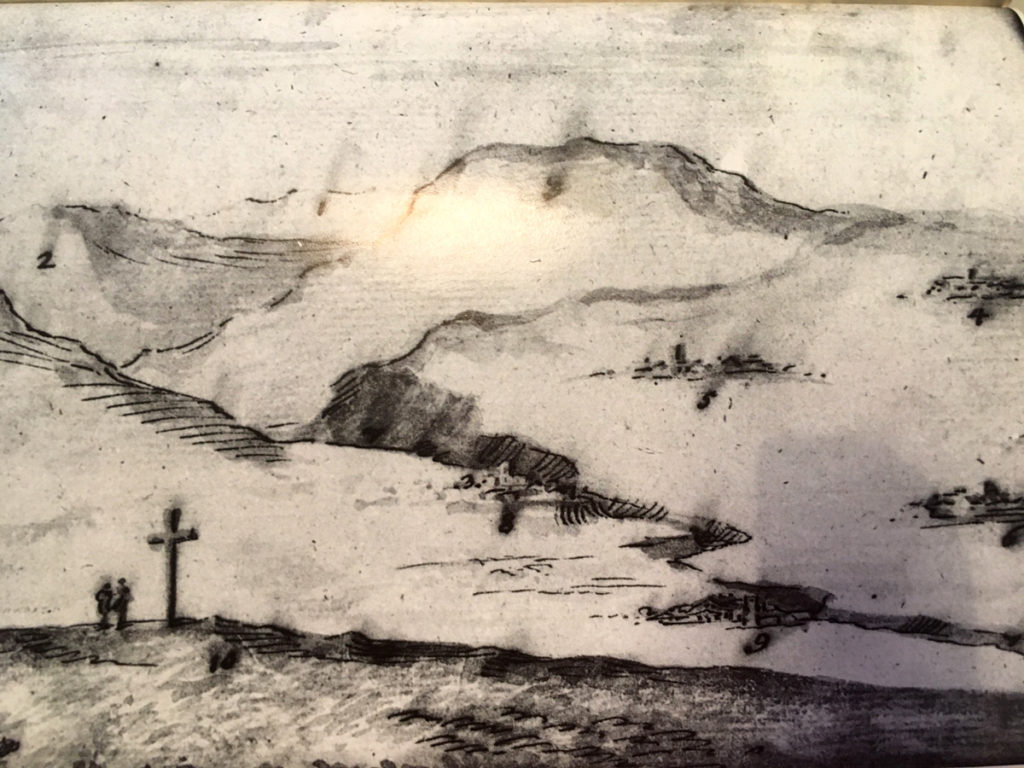
I started this series of brief articles by explaining why I chose to become a tourist guide.
Leaving aside sentiment and rhetoric dictated by the moment, I’d like to present to you some of the sources of my modest, yet handy, knowledge.
My library for example. Two plain sets of shelves, purchased at IKEA, similar to what you find in households everywhere. It is packed with books stacked double file, almost all of them regarding the history and territory of Lucca.
There is one that is especially dear to me and I’d like to tell you about it. It was written by Georg Christoph Martini, an 18th-century painter and chronicler, during a trip to Tuscany.
My copy is a second edition published by Maria Pacini Fazzi and is a fount of information regarding life and society in 18th-century Lucca. This inquisitive German traveler, probably of Italian origin, wrote it in diary form. It was so detailed and precise that when he died in Lucca on 21 December 1745, after years of a pleasant and fruitful stay, the Republic of Lucca decided to hide it in the secret archives known as Tarpea. Today the original copy can be found in the State Archives. The book, like the original manuscript, has detailed illustrations, skillfully done by this painter, who was called ‘il Sassone’ (the Saxon) by the locals. He may have even been one of the teachers of Lucca’s famous painter Pompeo Batoni. With great intellectual acumen, curiosity, and power of observation, he described places, people, works of art, and situations with pleasant irony; a jovial person who observed the habits and customs of a friendly, but foreign people through a magnifying glass.
At this point, I’d like to illustrate one of his more pleasant and colorful anecdotes.
Thanks to our friend Georg’s intelligence, affability, and professional skills, he quickly got into the nobility and wealthy merchant class’s good graces and consequently, was invited to all the most beautiful homes and estates and was accompanied to visit the most picturesque places in the territory of Lucca.
And so it was that one day he was horse riding in the Serchio River Valley toward Bagni di Lucca (today this would be a half day bus excursion) in the company of three noblemen. It was a three-day trip, including a difficult climb up to a mountain top. After a picnic consisting of prosciutto, salami, and wine (from his comments, Georg had a hearty appetite), the men got back on their horses. Having reached the mountain top, they then began their descent.
Our friend wrote, “I remember as we made our way back down, we passed a chapel, and the guide (Ed. guides already existed!) offered me some holy water, as was custom. I declined the offer and he stared at me in wonder. Then when he and my other traveling companions knelt in front of a cross to pray, I remained on my horse. The guide’s astonishment grew. Shepherds, who would spend their summers on the mountains with their flocks, had also joined us and because I did not get off my horse, they believed I was not a Christian. They thought that I was perhaps a sorcerer. So one of the shepherds approached me and pointed out an old tower in ruins in the distance, where, it was said, lay a buried treasure. Then he asked if I knew someone who was skilled in treasure hunting. When I understood what he was after, I laughed heartily and my friends who were a few steps ahead, turned round to ask why I was laughing. I explained that those good-hearted men thought people of my religion were venerable wizards. The kind shepherd, who was somewhat embarrassed and wanted to apologize, asked if it was not true that in France and other countries, such people existed. He followed me and said that they were in four, all willing to dig, if someone would tell them what to do. And no matter how much I insisted that they were all out of their minds, I am certain he still believed I was a sorcerer.”
This excerpt, and those before and after, show, in synthesis, a desire to travel, meet new people, do new things, and the existence of local guides, although the latter appear more interested in ‘magical powers’ and perhaps the money that, in one way or another, clients might favor them with. So should you find this book in an antique market stand, don’t pass it by!
Georg has been a friend of mine for some time and if you continue to follow me in my excursions, you can be sure I’ll slip in one of his anecdotes or comments.
Gabriele